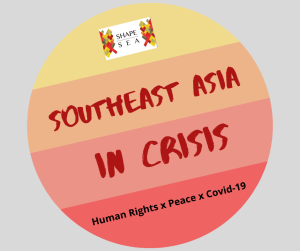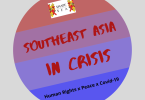Eugene YappSenior Fellow, Religious Freedom InstituteSouth and South East Asia Team30 March 2020
 A great concern in connection with the spread of the Corona virus/COVID-19 in many parts of the world, particularly in Malaysia  arose from the large-scale gathering of people in connection with religious events .On 26 March, Malaysian national health director-general, Dr Noor Hisham Abdullah announced that five groupings of people infected with  Covid-19 from the Seri Petaling tabligh gathering  had been detected. This state of affairs present a significant challenge to the state and federal health authorities as it seeks to contain the virus from further spread.The occasion for this unfortunate circumstance arose from a religious gathering during the Tabligh Jammat event held at Masjid Jamek Sri Petaling  in Malaysia from February 27 to March 3. According to health authorities, the gathering attracted some 16,000 participants. More than 711 index cases of people infected with Covid-19  were subsequently identified, who have then infected families, neighbours and friends.At the same time, on March 8, it a large-scale Hindu festival took place in Teluk Bahang in conjunction with the Masi Magam Theppa Thirunal (Floating Chariot Festival) at the Sri Singamuga Kaliamman Temple. The celebration saw more than 30,000 people thronging the temple to take part in prayer sessions and other religious rituals. Fortunately, Penang state authorities reported that there has been no cases of Covid-19 infection detected among the people who attended the event.Outside Malaysia, concerns have also arisen from other religious gatherings in the region, namely, the tabligh gathering at Sulawesi which was subsequently called off and the secretive gathering of the exclusive  sect called the Shincheonji Church of Jesus where thousands of the church’s followers and people were tested positive.Should these Gatherings go on during Covid-19? There are many reasons why  religious adherence go to such length to fulfil their religious obligations in the face of risks to health and life. One reason could well be what Malaysian  Deputy Minister of Women and Family Development, Siti Zailah Mohd Yusoff said in twitter,  “The likelihood of dying from the Coronavirus is only 1%, while the possibility of dying at any moment is 100%. Let’s renew our faith and fear God, truly death is real and it comes unexpectedly.†(emphasis added).Faith and fear of God often compels people to act in ways that could easily be misunderstood.  While believers of all faith traditions and beliefs choose to place their hopes and trust in the divine for protection and deliverance, it should be borne in mind religion is never dualistic in the sense of “me and my Godâ€. There is always the “otherâ€. True faith and piety can never be unless we love and consider the other in our midst.  This is where the right to freedom of religion and belief becomes important, for religious freedom is as much a right for one’s own expression of faith as it is for the consideration of others’ welfare and rights.Are there limits to Religious Freedom?International norms have never denied the right to freedom of religion and belief is deeply rooted in faith, universal in nature and appears capricious. But like all other rights, it is not absolute. In exceptional circumstances, it may be limited or restricted. Religious freedom scholar, Paul Marshall helps us to understand what religious freedom really is,
A great concern in connection with the spread of the Corona virus/COVID-19 in many parts of the world, particularly in Malaysia  arose from the large-scale gathering of people in connection with religious events .On 26 March, Malaysian national health director-general, Dr Noor Hisham Abdullah announced that five groupings of people infected with  Covid-19 from the Seri Petaling tabligh gathering  had been detected. This state of affairs present a significant challenge to the state and federal health authorities as it seeks to contain the virus from further spread.The occasion for this unfortunate circumstance arose from a religious gathering during the Tabligh Jammat event held at Masjid Jamek Sri Petaling  in Malaysia from February 27 to March 3. According to health authorities, the gathering attracted some 16,000 participants. More than 711 index cases of people infected with Covid-19  were subsequently identified, who have then infected families, neighbours and friends.At the same time, on March 8, it a large-scale Hindu festival took place in Teluk Bahang in conjunction with the Masi Magam Theppa Thirunal (Floating Chariot Festival) at the Sri Singamuga Kaliamman Temple. The celebration saw more than 30,000 people thronging the temple to take part in prayer sessions and other religious rituals. Fortunately, Penang state authorities reported that there has been no cases of Covid-19 infection detected among the people who attended the event.Outside Malaysia, concerns have also arisen from other religious gatherings in the region, namely, the tabligh gathering at Sulawesi which was subsequently called off and the secretive gathering of the exclusive  sect called the Shincheonji Church of Jesus where thousands of the church’s followers and people were tested positive.Should these Gatherings go on during Covid-19? There are many reasons why  religious adherence go to such length to fulfil their religious obligations in the face of risks to health and life. One reason could well be what Malaysian  Deputy Minister of Women and Family Development, Siti Zailah Mohd Yusoff said in twitter,  “The likelihood of dying from the Coronavirus is only 1%, while the possibility of dying at any moment is 100%. Let’s renew our faith and fear God, truly death is real and it comes unexpectedly.†(emphasis added).Faith and fear of God often compels people to act in ways that could easily be misunderstood.  While believers of all faith traditions and beliefs choose to place their hopes and trust in the divine for protection and deliverance, it should be borne in mind religion is never dualistic in the sense of “me and my Godâ€. There is always the “otherâ€. True faith and piety can never be unless we love and consider the other in our midst.  This is where the right to freedom of religion and belief becomes important, for religious freedom is as much a right for one’s own expression of faith as it is for the consideration of others’ welfare and rights.Are there limits to Religious Freedom?International norms have never denied the right to freedom of religion and belief is deeply rooted in faith, universal in nature and appears capricious. But like all other rights, it is not absolute. In exceptional circumstances, it may be limited or restricted. Religious freedom scholar, Paul Marshall helps us to understand what religious freedom really is,
Religious freedom normatively as a freedom that, like all freedoms, is inherently subject to many restrictions—such as others’ rights to life or health. Here religious freedom is defined as a freedom that is, like all others, necessarily restricted by other freedoms, and also by the duties that we all must follow. This is similar to the position taken in Article 18 of the International Covenant on Civil and Political Rights …….. An alternative is to define religious freedom in very broad terms without including any possible restrictions in the definition. But we could then add that religious freedom may legitimately be restricted in certain circumstances but that we need to call a spade a spade and call these restrictions what they are: actual (if justifiable) limits on religious liberty.
As Marshall notes, if religious freedom is to be limited or restricted, it  must never be employed arbitrarily, for example, to target a particular religion or religious community. It must be preceded with overwhelming evidence available to all, that public health would be severely endangered and harm to the public is likely. And before undertaking any limitation or restrictions,  consultation must be held with all stakeholders to ensure that the act of limitation or restrictions  is desirable and proportionate to the aim of the limitation or restrictions.A  decree to limit or restrict religious freedom must also be clear and transparent as to its scope, must be time-limited and with clear indication when the decree will end or likely end. The presumption is in favour of religious freedom for all people anytime anywhere unless clear evidence to show widespread community transmission would endanger life. The onus or burden, is for states to justify on grounds of legitimacy the limitation or restrictions on public gatherings for worship and occasion for religious festivals.More often than not, there may be an instance when the government’s restriction is justified. However, when the situation change, authorities may be slow to act to delimit or remove those restrictions. A clear frame of reference as we have expressed is therefore necessary to avoid the confusion of the rights of believers with faith itself and to ensure the state does not end up usurping the role and dictating to religious institutions what it can or cannot do. This is in order for human rights to be always upheld even in the midst of a pandemic affecting a democratic polity.References:Hong, Bebe, 2020. Health Ministry Wants to Halt Tabligh Cluster Spread at 5th Generation. The Malaysian Insight, 26 March. Available at: <https://www.themalaysianinsight.com/s/232352> Dermawan, Audrey, 2020. No Report of Covid-19 Cases Among Penang Chariot Fest Attendees. New Straits Times, 24 March. Available at: <https://www.nst.com.my/news/nation/2020/03/577719/no-report-covid-19-cases-among-penang-chariot-fest-attendees>. FMT Reporters, 2020. Deputy Minister Closes Twitter Account After Uproar over Covid-19 Post. FMT News, 16 March. Avaialble at: <https://www.freemalaysiatoday.com/category/nation/2020/03/16/deputy-minister-closes-twitter-account-after-uproar-over-covid-19-post/>. Marshall, Paul, 2020. Do Government Restrictions on Larger Church Gathering Violate Religious Freedom? Providence, 27 March. Available at: <https://providencemag.com/2020/03/government-restrictions-larger-church-gathering-violate-religious-freedom/>.





